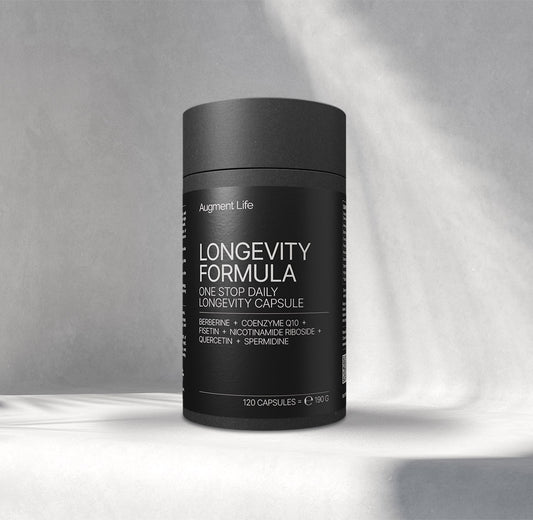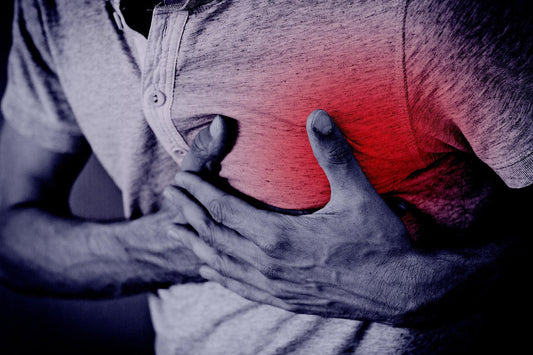Every once in a while, everyone needs help improving their health with dietary supplements. They provenly help with a myriad of conditions, such as boosting the immune system and improving skin conditions, but also provide support to women-specific conditions like menopause, libido, and fertility.
If you want to find out which supplements help with symptoms of menopause, potentiate libido, and improve women's fertility, keep reading this article.
Menopause supplements
Even though there are estrogen hormone replacement therapies that can be used throughout menopause, many women still prefer natural botanical and dietary supplements to treat symptoms like hot flashes and mood changes. In the case of menopause, it doesn't even matter that most of the supplements are not thoroughly researched in human clinical trials, they are still preferred over hormonal therapies.
However, several supplements are proven to help with menopausal symptoms. Those are:
- Black cohosh (lat. Cimicifuga racemosa) - an ancient herb that helps treat menopausal symptoms like hot flashes, irritability, and night sweats (1).
- Soy/Isoflavones (plant estrogens) - effective in reducing hot flashes after a longer time of supplementation, may help with bone strength (2),
- Calcium and vitamin D - prevent bone mass loss and the development of osteoporosis during and after menopause (3).
Even though some studies are showing the positive effects of these supplements, others show the opposite or rather no effect on menopausal symptoms at all. The number of studies done on menopause is in general small and many clinical trials end up being inconsistent.
Other commonly used plant extracts and supplements for menopause are:
- Evening primrose oil - may help with hot flashes and night sweats in postmenopausal women (4),
- St. John’s wort - may help alleviate symptoms like hot flashes, but studies are inconsistent (5),
- Wild yams - studies inconsistently show that wild yam extract can help treat psychological symptoms of menopause, probably because of its high (phyto)estrogen content (6),
- Ginseng - limited studies show that ginseng can improve hot flashes and the quality of life in menopause, but more data is needed (7),
- Red clover - known to be full of isoflavones (phytoestrogens), red clover extract may help relieve menopausal symptoms with inconsistent results coming from human clinical trials (8),
- Dong Quai - ancient Chinese herb that helps treat menopausal symptoms only in combination with other plant extracts and supplements (9),
- Fennel - may significantly improve menopausal symptoms (10).
Women's libido supplements
Women's libidos can naturally decrease as a result of health or life consequences, for example, because of menopause. There are plenty of libido-enhancing supplements available on the market, both natural and synthetic.
Libido-enhancing supplements for women, that are backed up by science (11), are:
- Ginseng - several studies have shown that ginseng benefits sexual function and libido in menopausal women, with limited evidence in the case of pre-menopausal women,
- Maca - even though not a lot is known about the dosage and safety of maca, this popular ancient plant has been used as a treatment for low libido and menopause for a very long time, and one clinical study showed it can significantly increase sexual function in menopausal women (12),
- L-arginine - an amino acid supplement that is very effective in combination with other libido-improving compounds (ginseng and ginkgo), and it can improve sexual function, vaginal dryness, satisfaction with sexual relationship, sexual arousal, and satisfaction with overall sex life in premenopausal and menopausal women (11).
Some supplements that help relieve symptoms of menopause, such as vaginal dryness, may also be used to help improve sexual function. Those are, for example, red clover and black cohosh, even though data is so far limited (11).
Women's fertility supplements and vitamins
Low fertility is a major problem for anyone who wishes to conceive a child. It can be caused by several health issues, which makes it difficult to improve.
The most successful treatments are medical, but many people opt for a more natural approach, especially in the form of dietary supplements and vitamins. Even if you are just starting to think about having a child, it's a good idea to take some prenatal vitamins and supplement your body with enough of what the baby will need while it grows.
As the frequency of fertility issues rises, so does the number of potential remedies one can take to improve it. However, not all of them are proven effective or even safe. The fertility supplements for women that are backed up by science are:
- Folic acid - improves fertility and helps with the neuronal development of the fetus (13),
- L-carnitine - improves fertility and conditions like endometriosis and polycystic ovarian syndrome (PCOS) (14),
- Omega-3 fatty acids - one study found that women who took these fatty acids were more likely to conceive (15),
- Vitamin D - low fertility and vitamin D deficiency have been associated multiple times in both women and men (16),
- Coenzyme Q10 - supplementation can improve the chances of conceiving a child, especially in women who are undergoing IVF or have PCOS (17),
- Selenium, Zinc, Iron - while selenium supports the health of follicular fluid in the vicinity of eggs, iron, iodine, calcium, and zinc deficiencies have been associated with lower fertility rates (18).
In case of trying to conceive a child, it is always best to take a prenatal multivitamin that contains all of these compounds, and many more vitamins and minerals for an overall healthy body.
If you have been trying to conceive for a longer time without success, schedule an appointment with your doctor. It may be a medical issue that is not treatable with supplements.
Literature:
1. Wobser RW, Takov V. Black Cohosh. [Updated 2023 May 21]. In: StatPearls [Internet]. Treasure Island (FL): StatPearls Publishing; 2023 Jan.
2. Chen LR, Chen KH. Utilization of Isoflavones in Soybeans for Women with Menopausal Syndrome: An Overview. Int J Mol Sci. 2021 Mar 22;22(6):3212. doi: 10.3390/ijms22063212.
3. Mei Z, Hu H, Zou Y, Li D. The role of vitamin D in menopausal women's health. Front Physiol. 2023 Jun 12;14:1211896. doi: 10.3389/fphys.2023.1211896.
4. Kazemi F, Masoumi SZ, Shayan A, Oshvandi K. The Effect of Evening Primrose Oil Capsule on Hot Flashes and Night Sweats in Postmenopausal Women: A Single-Blind Randomized Controlled Trial. J Menopausal Med. 2021 Apr;27(1):8-14. doi: 10.6118/jmm.20033.
5. Abdali K, Khajehei M, Tabatabaee HR. Effect of St John's wort on severity, frequency, and duration of hot flashes in premenopausal, perimenopausal and postmenopausal women: a randomized, double-blind, placebo-controlled study. Menopause. 2010 Mar;17(2):326-31. doi: 10.1097/gme.0b013e3181b8e02d.
6. Hsu CC, Kuo HC, Chang SY, Wu TC, Huang KE. The assessment of efficacy of Diascorea alata for menopausal symptom treatment in Taiwanese women. Climacteric. 2011 Feb;14(1):132-9. doi: 10.3109/13697137.2010.498594.
7. Lee HW, Ang L, Lee MS. Using ginseng for menopausal women's health care: A systematic review of randomized placebo-controlled trials. Complement Ther Clin Pract. 2022 Aug;48:101615. doi: 10.1016/j.ctcp.2022.101615.
8. Kanadys W, Barańska A, Błaszczuk A, Polz-Dacewicz M, Drop B, Kanecki K, Malm M. Evaluation of Clinical Meaningfulness of Red Clover (Trifolium pratense L.) Extract to Relieve Hot Flushes and Menopausal Symptoms in Peri- and Post-Menopausal Women: A Systematic Review and Meta-Analysis of Randomized Controlled Trials. Nutrients. 2021 Apr 11;13(4):1258. doi: 10.3390/nu13041258.
9. Johnson A, Roberts L, Elkins G. Complementary and Alternative Medicine for Menopause. J Evid Based Integr Med. 2019 Jan-Dec;24:2515690X19829380. doi: 10.1177/2515690X19829380.
10. Ghaffari P, Hosseininik M, Afrasiabifar A, Sadeghi H, Hosseininik A, Tabatabaei SM, Hosseini N. The effect of Fennel seed powder on estradiol levels, menopausal symptoms, and sexual desire in postmenopausal women. Menopause. 2020 Nov;27(11):1281-1286. doi: 10.1097/GME.0000000000001604.
11. Dording CM, Sangermano L. Female Sexual Dysfunction: Natural and Complementary Treatments. Focus (Am Psychiatr Publ). 2018 Jan;16(1):19-23. doi: 10.1176/appi.focus.20170049.
12. Dording CM, Schettler PJ, Dalton ED, Parkin SR, Walker RS, Fehling KB, Fava M, Mischoulon D. A double-blind placebo-controlled trial of maca root as treatment for antidepressant-induced sexual dysfunction in women. Evid Based Complement Alternat Med. 2015;2015:949036. doi: 10.1155/2015/949036.
13. Kadir M, Hood RB, Mínguez-Alarcón L, Maldonado-Cárceles AB, Ford JB, Souter I, Chavarro JE, Gaskins AJ; EARTH Study Team. Folate intake and ovarian reserve among women attending a fertility center. Fertil Steril. 2022 Jan;117(1):171-180. doi: 10.1016/j.fertnstert.2021.09.037.
14. Agarwal A, Sengupta P, Durairajanayagam D. Role of L-carnitine in female infertility. Reprod Biol Endocrinol. 2018 Jan 26;16(1):5. doi: 10.1186/s12958-018-0323-4.
15. Stanhiser J, Jukic AMZ, McConnaughey DR, Steiner AZ. Omega-3 fatty acid supplementation and fecundability. Hum Reprod. 2022 May 3;37(5):1037-1046. doi: 10.1093/humrep/deac027.
16. Fung JL, Hartman TJ, Schleicher RL, Goldman MB. Association of vitamin D intake and serum levels with fertility: results from the Lifestyle and Fertility Study. Fertil Steril. 2017 Aug;108(2):302-311. doi: 10.1016/j.fertnstert.2017.05.037.
17. Florou P, Anagnostis P, Theocharis P, Chourdakis M, Goulis DG. Does coenzyme Q10 supplementation improve fertility outcomes in women undergoing assisted reproductive technology procedures? A systematic review and meta-analysis of randomized-controlled trials. J Assist Reprod Genet. 2020 Oct;37(10):2377-2387. doi: 10.1007/s10815-020-01906-3.
18. Skoracka K, Ratajczak AE, Rychter AM, Dobrowolska A, Krela-Kaźmierczak I. Female Fertility and the Nutritional Approach: The Most Essential Aspects. Adv Nutr. 2021 Dec 1;12(6):2372-2386. doi: 10.1093/advances/nmab068.










